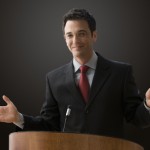 I remember the very first networking event I ever attended. It was almost ten years ago. We all sat at a long oak table in the back room of a local restaurant. The leader of the group wore a bright red jacket and after she made opening announcements, we went around the table, saying who we are and what we do. I had never done that before! Some people sounded polished, while others rambled on without communicating anything specific. As we worked our way around the table and my turn approached, I could feel my heart pounding in my chest. What would I say, how could I possibly communicate what I do in one little sentence? Fear gripped my body and mind. I can’t remember what I said, but I do remember the sweaty palms, the thumping in my chest, and the numbing brain freeze.
I remember the very first networking event I ever attended. It was almost ten years ago. We all sat at a long oak table in the back room of a local restaurant. The leader of the group wore a bright red jacket and after she made opening announcements, we went around the table, saying who we are and what we do. I had never done that before! Some people sounded polished, while others rambled on without communicating anything specific. As we worked our way around the table and my turn approached, I could feel my heart pounding in my chest. What would I say, how could I possibly communicate what I do in one little sentence? Fear gripped my body and mind. I can’t remember what I said, but I do remember the sweaty palms, the thumping in my chest, and the numbing brain freeze.
Have you had a similar experience? Speaking in public can be nerve-wracking, but with practice it can be very rewarding and lead to career advancement. Now I use speaking in conjunction with my private consulting and coaching. I speak to audiences on how to upgrade their personal branding and professional image for increased influence and polished presence.
 Many business professionals need the help that your products or services can deliver, but they don’t even know you exist. They don’t do a Google search for you because they have no idea that there are solutions like the ones you’ve developed. You need to reach that market and give them solutions to their pain. Speaking to groups, associations, organizations and companies is a wonderful way to increase the scope of your audience.
Many business professionals need the help that your products or services can deliver, but they don’t even know you exist. They don’t do a Google search for you because they have no idea that there are solutions like the ones you’ve developed. You need to reach that market and give them solutions to their pain. Speaking to groups, associations, organizations and companies is a wonderful way to increase the scope of your audience.
Toastmasters is a good way to get started speaking in front of a group of people who are friendly, supportive, and helpful. The organization provides you with workbooks to guide you through the process of writing and delivering short speeches. Members of the club give you beneficial feedback to help you learn and grow.
 Just because you can ice skate doesn’t mean you’re ready to go on tour with the Ice Capades. Like with any venture, public speaking takes lots of training, coaching, planning and practice. There are many elements to consider: content, personal stories, interactive exercises, length, topic, and of course, your voice. Seek out the services of some good coaches in your area. Attend a National Speakers Association event and ask around, who are the good coaches. Two of my favorite books on how to assemble a speech are Resonate by Nancy Duarte and Presentation Zen by Garr Reynolds. My colleague and friend, Jean DiGiovonna (https://www.workshopuniversity.com), is also an excellent resource to help you structure a speech, workshop, or presentation.
Just because you can ice skate doesn’t mean you’re ready to go on tour with the Ice Capades. Like with any venture, public speaking takes lots of training, coaching, planning and practice. There are many elements to consider: content, personal stories, interactive exercises, length, topic, and of course, your voice. Seek out the services of some good coaches in your area. Attend a National Speakers Association event and ask around, who are the good coaches. Two of my favorite books on how to assemble a speech are Resonate by Nancy Duarte and Presentation Zen by Garr Reynolds. My colleague and friend, Jean DiGiovonna (https://www.workshopuniversity.com), is also an excellent resource to help you structure a speech, workshop, or presentation.
When presenting to any group, you always want to dress one or two notches up from your audience. You are the expert, you’re delivering a solution to their pain, an answer to their needs. Therefore, you need to look, act, and sound the part of an expert.
 Looking the part probably includes wearing a jacket of some sort. A jacket, especially with a collar, sends the message of competency, capability, and a business mentality. Slacks or trousers and a shirt or blouse should be of good quality, fit you well, and flatter your shape. Accessories should be the best quality you can afford, in a color that flatters your skin tone.
Looking the part probably includes wearing a jacket of some sort. A jacket, especially with a collar, sends the message of competency, capability, and a business mentality. Slacks or trousers and a shirt or blouse should be of good quality, fit you well, and flatter your shape. Accessories should be the best quality you can afford, in a color that flatters your skin tone.
Acting the part of an expert means speakers who are presenting to an audience need to be aware of their posture, hand gestures, facial expressions, and all body movements. The best way to see what you are doing is to record yourself while practicing and speaking to an audience. Make note of any body language that is a distraction to the audience hearing your message. Then rehearse those affectations out of your delivery.
Be authentic. Don’t try to imitate another speaker or someone else; be yourself. You want to build trust. In your opening, tell a short story about a time when you were vulnerable or not at your best, but overcame an obstacle. Then talk about what you learned from that situation. Ask the audience if they’ve had a similar experience. Then tell them the point of the story. That point needs to be applicable to your core message, the reason you are speaking, the solution that your expertise offers to their needs.
 Before you attempt your first venture into speaking to an audience, go to networking events, group meetings and associations where speakers are presenting. Take note of everything that works about their delivery, content, and any audience participation. Notice also what doesn’t work, what gets in the way of attendees’ learning. Write down what worked, what didn’t work, and why. How could you apply what you observed to make your own presentation better?
Before you attempt your first venture into speaking to an audience, go to networking events, group meetings and associations where speakers are presenting. Take note of everything that works about their delivery, content, and any audience participation. Notice also what doesn’t work, what gets in the way of attendees’ learning. Write down what worked, what didn’t work, and why. How could you apply what you observed to make your own presentation better?
Before presenting for the first time to an audience at a MeetUp group or association, gather together some friends, family members, or colleagues for a practice session. Rehearse before they arrive and even record yourself to minimize nerves and distractions. Ask your practice audience to take notes and give you feedback and constructive criticism to help you improve.
When you’re ready, call local Rotary Clubs, MeetUp groups, church and community clubs, and networking events in your area to tell them you’ve got a beneficial program that you think they would enjoy. Sell yourself as an expert, but don’t expect to get paid at first.
 You may, however, form relationships which may evolve into paying clients and additional speaking opportunities. Be open to possibilities while staying confident, authentic, and relevant.
You may, however, form relationships which may evolve into paying clients and additional speaking opportunities. Be open to possibilities while staying confident, authentic, and relevant.
Would you like to present with confidence, influence, and polished delivery to expand your success? You can, and I can help. When you are that confident expert, you will be able to make that contribution to your family, your career, to the world, that only you can give. We can make that happen. Call for a free 30 minute phone consultation: 720-933-9247.
Marian Rothschild, is a certified personal image consultant, personal branding expert, speaker and award-winning author. We help savvy business professionals upgrade their personal brands visually, head-to-toe, and authentically from the inside-out, for increased influence and polished presence. Call now for a free 30-minute phone consultation at 720-933-9247.

I LIKE it Marian – nicely presented. Another resource for building speaking skills is Toastmasters. Especially for developing basic speaking skills or refining speaking skills and developing authenticity.
Stephen,
Thank you for your comment.
Actually, I mentioned Toastmasters as a great resource, right in the middle of the article.